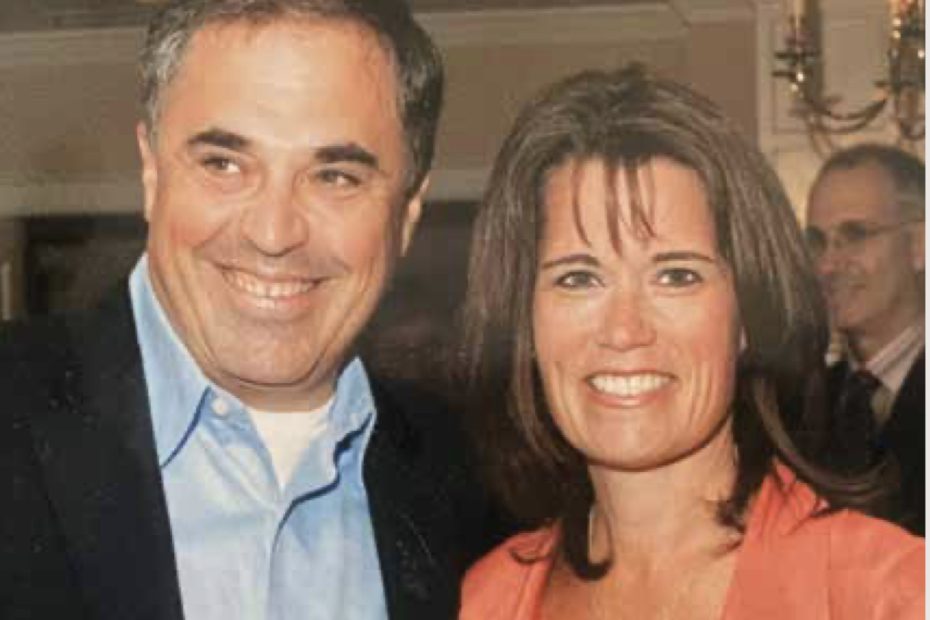The Colorectal Cancer Research Center of Excellence researchers and clinicians are dedicated to finding better ways to prevent and treat colorectal cancer. “We cannot do those things, but we can support their efforts, and the most direct and meaningful way to support their efforts is philanthropically,” says Roger Leventer of the team he is leading, which is aimed at raising $10 million for the Colorectal Cancer Research Center of Excellence. Their mission, he says, is to help these researchers and clinicians continue their important work.
Roger Leventer
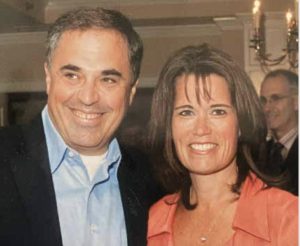
Roger Leventer’s commitment to advancing colorectal cancer research and treatment was inspired by the loss of his wife, Lynda, to advanced colorectal cancer.
He calls the campaign a grassroots effort, and he is focused on reaching as many people as possible. To him, every gift, large or small, is vital to winning the battle against colorectal cancer.
“It’s not the size of the checks, it’s the number of the people that are getting involved that is making a difference,” says Leventer. “We are showing people how everybody can help fight cancer and save lives.”
He also established the Lynda Leventer Fund, which supports the campaign.
The campaign has already funded clinical trials that have resulted in promising new treatments for colorectal cancer that have extended survival.
Eben and Wendy Block
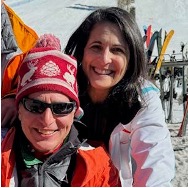
Eben Block had just celebrated his 49th birthday in 2009 when he was diagnosed with advanced colorectal cancer. That same day, he contacted Roger and Lynda Leventer. Lynda had been diagnosed with colorectal cancer a few months earlier. Following Roger’s advice, Block scheduled an appointment at the Johns Hopkins Kimmel Cancer Center and was treated by the same doctors who were taking care of Leventer.
“Lynda had a great team, so we went with that and knew we were in good hands,” says Block.
Block was in great health. He was active, playing ice hockey and cycling more than 100 miles per week when he learned the shocking news that he had cancer. With his wife, Wendy, by his side as his caregiver, Block made it through the rigorous cancer treatment, which included a nine-hour surgery. He returned to biking just a month later.
Grateful for the care he received, and eager to help other patients, Block worked with Roger Leventer to turn his cycling passion into a way to raise money for the Center of Excellence campaign.
They started the Cycling to End Cancer fundraiser in 2022. The virtual event allows participants to bike at their own pace and skill level. In two years, they raised more than $140,000 and funded clinical trials that have saved lives, including a trial of a drug combination led by Eric Christenson, M.D. This year’s event will be expanded beyond cycling to include walking and running and rebranded End Cancer 2024: Cycle, Run & Walk. Block also hopes to add corporate sponsors for the next event.
Brian Cornblatt
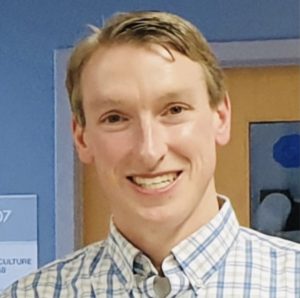
When Brian Cornblatt, Ph.D., lost a friend to cancer in high school, he turned what he considered his worst subject — biology — into a major, hoping to make a difference.
He had begun an M.D./Ph.D. program at the Johns Hopkins University School of Medicine when in 1996, cancer struck again. This time, it was his father, and the news was not good. The diagnosis was advanced colorectal cancer, and he was given a small chance of survival.
Cornblatt’s father beat the odds and survived his cancer. Brian’s mother was diagnosed seven years ago with early-stage colorectal cancer but is cancer free today.
His parents’ diagnoses cemented Cornblatt’s commitment to cancer prevention.
“The best cancer therapies we had only helped a small fraction of people,” he says. He changed his career path and began working in the laboratory of Paul Talalay, M.D., an internationally renowned Johns Hopkins scientist who launched the field of chemoprevention with his discovery that sulforaphane, a chemical abundant in broccoli sprouts, activates a molecular pathway that can protect against cancer.
Cornblatt worked in Talalay’s lab and with other leading experts in cancer prevention. This led him to join private industry, developing plant-based supplements aimed at arming the body with defenses against cancer.
BioHarvest Sciences, where Brian serves as Chief Medical Officer, is sponsoring a study of a plant-based supplement to impede treatment-related side effects, including painful damage to nerves (neuropathy) and changes in mental cognition.
Cornblatt is also working with Eben Block and Roger Leventer on End Cancer 2024: Cycle, Run & Walk.
George and Patricia Davis
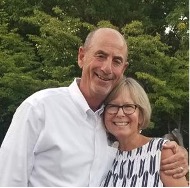
George Davis hosts the Rhythm of Life event with his wife, Patricia Shields Davis, and professional baseball player and colorectal cancer survivor Trey Mancini at Gertrude’s Chesapeake Kitchen restaurant at the Baltimore Museum of Art. George and Patricia also serve on the Johns Hopkins Patient and Family Advisory Council. The first Rhythm of Life event was sold out and raised nearly $100,000 for a clinical trial of a cancer vaccine, led by Nilo Azad, M.D. The 2024 event is planned for September and includes acoustic performances by guitar maker and performer Paul Reed Smith and William Nelson, M.D., Ph.D., Kimmel Cancer Center Director. Davis has dubbed the event “a party with a purpose.”
Kristine Dunkerton and Elsa Lankford
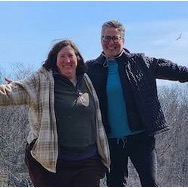
Kristine Dunkerton was diagnosed with Stage 4 colorectal cancer in 2021 on her 49th birthday. She has received more than 30 rounds of chemotherapy, three surgeries, immunotherapy, and proton therapy. Three times her cancer seemed to disappear, only to return again.
"I knew very little about cancer, and now I know more than I ever wanted to know,” says Dunkerton, an attorney who has run a nonprofit community law center for more than 25 years. “I want see more options, to push the envelope. Clinical trials are the only way to create more options.”
She and her partner and caregiver Elsa Lankford want to help Dunkerton’s oncologist, Eric Christenson, and Nilo Azad, Director of the Colorectal Cancer Research Center of Excellence, get more clinical trials up and running.
They got involved with Cycling to End Cancer because it directly supports colorectal cancer research at the Kimmel Cancer Center. She is calling upon her fundraising experience from her years of running a nonprofit to help get the word out. Dunkerton and Lankford set up “Team Kristine” to help raise money through the event.
Dunkerton and Lankford are advocates for patients and caregivers. Lankford, a Towson University professor, is on sabbatical to work on a podcast for caregivers, and Dunkerton continues to push for more research, particularly for early-onset colorectal cancer, which is on the rise.
Trey Mancini
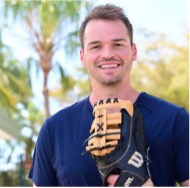
Professional baseball player and former Baltimore Oriole has turned his own battle with colorectal cancer into a way to help others. In addition to speaking to fellow colon cancer survivors, advocacy groups and medical professionals, he volunteers for the Colorectal Cancer Alliance. The Trey Mancini Foundation, which he started with his parents before his diagnosis, supports people facing illness, suffering from emotional trauma, and experiencing hardship. Since his diagnosis, cancer awareness was added to the foundation’s mission. The foundation is a sponsor of the Rhythm of Life fundraiser
Marco Schnabl
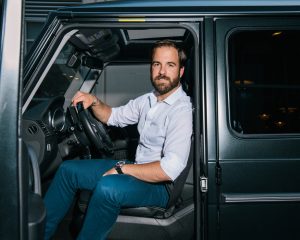
In 2019, Marco Schnabl established the Schnabl Family Fund in honor of his father, Fred, who died from colorectal cancer. Nilo Azad, M.D., provided care for Fred, who lived in Germany, via telemedicine. The Schnabl Family Fund supports research at the Colorectal Cancer Research Center of Excellence, directed by Azad. His most recent gift launched the Colorectal Cancer Convergence Program. Schnabl, who used data science to automate car sales, has provided invaluable expertise and supports the use of the same technologies to speed progress against colorectal cancer. The Colorectal Cancer Convergence Program includes three initiatives: A genomics workshop, a hands-on course for researchers on gene, biostatistical, and computational methods needed to work with and manage big data sets; CoFest!; and the Convergence Institute Research Symposium, featuring the Schnabl Distinguished Lectureship.
Laurie Singer
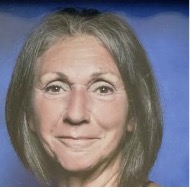
Laurie Singer has a special place in her heart for the caregivers of patients with cancer. She was plunged into the role in 2001 when her husband, Leroy Sievers, was diagnosed with colorectal cancer. Despite treatment, the cancer spread throughout his body, taking his life in 2008.
Laurie, a national news producer, and Leroy, an award-winning reporter, helped the world see the reality of wars, genocides and natural disasters. They did the same for cancer.
“We had covered so many difficult stories, including some on health and cancer, but when it hits you at home, you are caught unprepared,” says Singer.
With her help and with care from an expert team of Kimmel Cancer Center doctors who never gave up, Sievers survived for many more years than most with his diagnosis. He candidly chronicled his cancer battle in his blog My Cancer, which inspired patients and caregivers alike.
Singer created videos, including Chemo School, that helped patients and caregivers at the Kimmel Cancer Center prepare for treatment. She also volunteers at the Hackerman-Patz Patient and Family Pavilion, a home away from home for patients traveling to the Kimmel Cancer Center for treatment, and for their caregivers.
“The role of the caregiver is so important, and I feel lucky that I can advocate for them,” says Singer. “ This can be a forgotten piece of cancer care.”
Her goal is to ensure that caregiving has a key role at the Colorectal Cancer Patient Care and Research Center of Excellence, and that there is a mentoring program in which current and former patients and caregivers help coach and support people who are newly diagnosed and their caregivers. She also supports survivorship retreats during which patients and caregivers can interact and learn from one another.
“More and more cancer care is provided at home,” says Singer. “The caregiver’s role is essential to keeping the patient healthy.”
